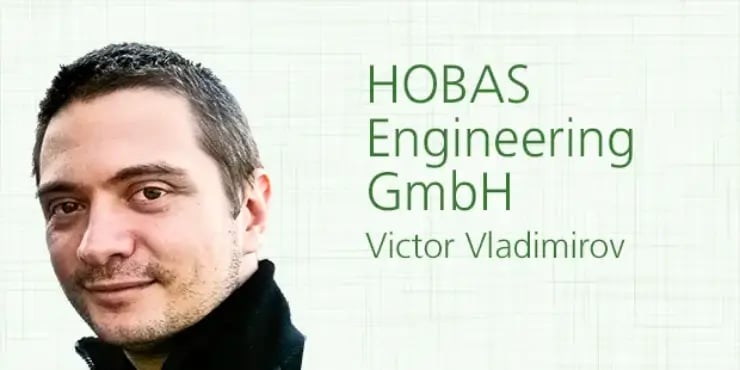Gathering quality data is one of the biggest challenges in producing accurate LCAs. In an interview with Victor Vladimirov, environment and energy manager at HOBAS Engineering GmbH, we discuss when it makes sense to collaborate with suppliers in the exchange of LCA data and the details that require the most attention.
When do you rely on a collaboration with your suppliers along the life cycle?
Collaboration within the supply chain is key to increased accuracy of the LCA analysis. Interesting situations may concern product R&D (i.e. new raw materials) and comparison of various scenarios (i.e. end of life)
What is your experience with the willingness of the life cycle partners/suppliers to collaborate?
Willingness may depend on the strength of the existing relationship. Companies that were already deeper involved regarding product and process development are more open to extend the collaboration to LCA level. In addition, there are also innovative companies with direct environmental focus that are open to LCA analysis on principle.
Another key aspect of collaboration is the sharing of proprietary data. Concerns may be issued that if LCA product models are shared, then proprietary data may be thus also transmitted. Even if confidentiality agreements are in place, there is always caution to sharing data that is part of the core competence of a company.
The advantage of using a LCA collaborative tool such as Umberto is that while models may be discussed together, data which is actually transmitted across the supply-chain can be safely communicated as a balance of material-flows, without the possibility of recalling specific proprietary data in the source model.
Sometimes collaboration fails, which are the biggest hurdles and challenges?
Failure may be seen also as a catalyst for further improvements. The challenge is to identify the causes which lead to failure and to be able to assign the appropriate resources for future collaborations. Experience is definitely an advantage while identifying collaboration benefits for all participants is a key factor to overcome any hurdles.
Do you have examples you can share with us of successful life cycle collaboration?
Definitely! We collaborated very successfully with REICHHOLD for an LCA study comparing the environmental performance of regular / recycled PET / bio-sourced unsaturated polyester resins. Calculations were performed with Umberto for LCA. The software represents the collaborative tool for LCA modeling between the two companies. This brought many benefits such as easy data exchange, valuation of results and visualization (at both technical and top management levels). Adopting a LCA collaborative tool such as Umberto and internalizing it constitutes sound premises for long term sustainability assessment.
Is there any special finding, a surprising result or improvement potential you found via a collaborative approach working along the life cycle with your suppliers?
The main finding here is to see LCA results as a dynamic process rather than a static result. For example sensitivity analysis and scenario development support the connection with R&D and technical departments; new products and raw materials can be tested and integrated in already existing models. Through the LCA, collaborating companies can immediately identify the main factors that determine the environmental impacts. For example, in the study with REICHHOLD we found out that recycled resin can be used for production of complete pipe systems, with positive environmental indicators. On the other hand, mechanical proprieties of bio-sourced resin restrict its usability and present similarities with the debate regarding bio-diesels. This is equally a starting point for further improvements to the resin formulations!
What would be your most important recommendation for newcomers to the LCA field?
One relevant recommendation is to carefully determine what they want to get out of an LCA: is it a one-time analysis only or a deeper commitment to understand and even internalize the analysis process? Answering this question and looking at available resources would determine the next steps on the path to an LCA.
Thank you Victor!






